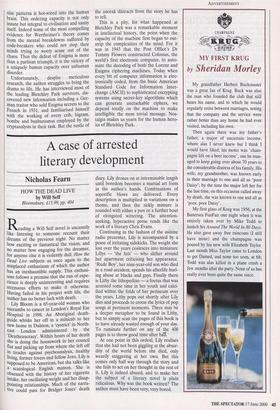A case of arrested literary development
Nicholas Fearn
HOW THE DEAD LIVE by Will Self
Bloomsbury, £15.99, pp. 404 R. eading a Will Self novel is uncannily like listening to someone recount their dreams of the previous night. No matter how exciting or fantastical the vision, and no matter how engaging for the dreamer, for anyone else it is violently dull. How the Dead Live subjects us once again to the misplaced enthusiasm of which the author has an inexhaustible supply. This enthusi- asm follows a premise that the run of expe- rience is deeply uninteresting and requires strenuous efforts to make it otherwise. Having failed in his project with life, the author has no better luck with death.
Lily Bloom is a 65-year-old woman who succumbs to cancer in London's Royal Ear Hospital in 1998. An Aboriginal death- guide whisks her off in a minicab to her new home in Dulston, a `cystrice in North- east London administered by the Deatheaucracy'. Within hours of her death she is doing the housework in her council flat and picking up from where she left off IO tirades against psychoanalysis, healthy living, former lovers and fellow Jews. Lily is supposed to be American, but she talks like a scatological English matron. She is Obsessed with the history of her cigarette intake, her oscillating weight and her disap- pointing relationships. Much of the narra- tive could pass for Bridget Jones' death diary. Lily drones on at interminable length until boredom becomes a martial art form in the author's hands. Combinations of soporific blows are delivered. Every description is multiplied in variations on a theme, and then the sickly mixture is rounded with either a pun or a further bout of elongated wittering. The attention- seeking, hyperactive prose reads like the work of a literary Chris Evans.
Continuing in the fashion of the asinine radio presenter, Lily is accompanied by a posse of irritating sidekicks. The weight she lost over the years coalesces into miniature Lillys — 'the fats' — who slither around her apartment criticising her appearance. 'Rude Boy', her nine-year-old son who died in a road accident, spends his afterlife hurl- ing abuse at blacks and gays. Finally there is Lithy the lithopedian — a foetus that was arrested some time in her youth and calci- fied within the folds of her perineum over the years. Lithy pops out shortly after Lily dies and proceeds to croon the lyrics of pop songs at pertinent moments. There may be a deeper metaphor to be found in Lithy, but to simply scan the pages of this book is to have already wasted enough of your day. To ruminate further on any of the 400 pages is to throw good time after ban.
At one point in this ordeal, Lily realises that she had not been giggling at the absur- dity of the world before she died, only wearily sniggering at her own. But this comes only half way through the story and she fails to act on her thought in the rest of it. Lily is indeed absurd, and to make her the subject of a literary novel is plain ridiculous. Why was the book written? The author must have been very, very bored.










































































 Previous page
Previous page